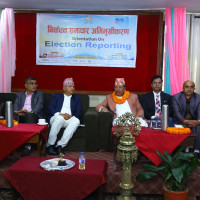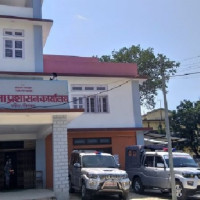- Sunday, 22 February 2026
Kathmandu-Tarai Expressway achieves 43.3% progress
By Anil Parajuli,Hetaunda, Nov. 10: The progress of the Kathmandu–Tarai Expressway Project has reached 43.3 per cent. However, the progress of the road construction, which is aimed to be completed by the year 2026, has been slower than expected.
As of mid-October this year, Rs. 82.17 billion has been spent on the project, but less than half of the construction work has been completed.
According to data released by the Nepali Army (NA), the undertaker of the project, the physical progress of the project stands at 43.66 per cent by mid-October.
The financial progress, including mobilisation, is at 44.89 per cent, according to Rajaram Basnet, information officer and Assistant Brigadier General of the NA.
"Work on the fast track is progressing rapidly; there has been no delay from our side. However, delays in some policy decisions have slowed the overall pace of progress," Basnet said. He added that an 81-metre-high bridge is under construction in the section connecting Lendanda to Dhedre in Makwanpur. Out of the 13 construction packages under the project's comprehensive plan, 12 packages are currently under construction or in the implementation phase.
The land acquisition process for the Khokana–Dukuchhap section is still pending, as decisions on the fast track's starting point and traffic management are yet to be made. Coordination is ongoing for the land compensation in the affected areas, Basnet informed.
The design work for resolving land acquisition issues is progressing. So far, 139 ropanis of private land and 14 ropanis of Guthi land in the Khokana–Dukuchhap area has been valued and are awaiting acquisition, while 165 ropanis of land is yet to be valued.
The final amount of land to be acquired may change based on design adjustments and the confirmation of the starting point of the fast track, as stated in the NA data.
The total length of the seven tunnels under the project is 10.979 km. The 3.35 km Mahadevtar tunnel has achieved 3,322 metres of excavation for the right tunnel (61 per cent) and 2,029 metres for the left tunnel (68 per cent).
Similarly, Dhedre and Lendanda tunnels (1,690 and 1,622 metres long, respectively) have already broken through. Construction progress for the Chandram Bhir tunnel
(2,250 metres) has reached 306 metres, while work on the Mouri Bhir (594 metres), Devi Chaur (1,000 metres), and Sisautar (390 metres) tunnels is ongoing.
Likewise, of the 89 bridges in the project, 85 have entered the construction phase.
Foundation work has been completed for 53 of these bridges, with superstructure work currently in progress.
Additionally, asphalt laying has been completed for 5 km of the sub-base and service lanes along the 9.3 km road. Furthermore, toll plazas and interchanges are being constructed in the Nijgadh area.
By the end of the last fiscal year 2024/25, about 17,895 trees were felled, bringing the total number of trees cut down to 53,242. Between 24.8 and 70.977 km of the project, land acquisition has been completed, and construction is now underway. Land acquisition is also ongoing in Kathmandu, Lalitpur, and Makwanpur districts for various sections of the project.
The government has approved additional land acquisitions and tree felling, particularly in the forest areas along the 35 to 49 km stretch and the 6.5 to 24 km stretch, where environmental impact assessments have been approved.
A total of 51.87 hectares of forest land in Makwanpur, Hetaunda, and Bakaiya has been authorised for use in the project, with 17,846 trees already felled.
For the fiscal year 2025/26, Rs. 2.44 billion has been allocated for the project, and about Rs. 1.63 billion has already been spent in the first three months. While the initial estimated cost of the project was Rs. 175 billion, the current estimated cost has risen to Rs. 211.19 billion.
The total length of the Kathmandu–Tarai–Madhesh Fast Track is 70.97 km, with Khokana as the starting point and Nijgadh as the endpoint.



-original-thumb.jpg)











